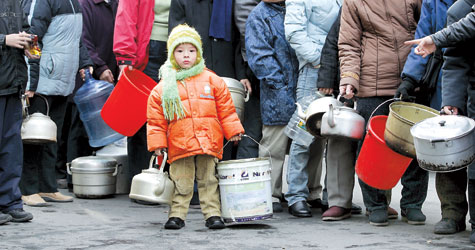
Pei Ziyao, 3, stands in line with his mother to receive water from a
distribution center in Harbin yesterday. The government is providing 20
kilograms of drinking water to every household after a chemical plant explosion
polluted the city's main supply source. [Photo: Jian Guangzhou]
An extensive cleanup operation is under way in northeast China's Heilongjiang
and Jilin provinces as an 80-kilometer slick of polluted water rolls down the
Songhua River.
Environmental experts are opening reservoirs in an effort
to dilute some 100 tons of dangerous chemicals¡ªprimarily benzene¡ªthat were
released in a chemical plant explosion on November 13.
Huge quantities
of absorbent carbon were also being brought in for use in purification.
Meanwhile, cities along the Songhua that use the river as their source
for drinking water have shut down municipal systems and are distributing water
drawn from wells, digging new wells and trucking in supplies from neighboring
areas to millions of thirsty residents.
The hardest hit city is Harbin,
provincial capital of Heilongjiang, where 3.8 million people won't be able to
turn on their taps for days.
The effects of the chemical spill are so
widespread that China is keeping in close contact with Russia, which fears its
own waterways might become tainted.
The polluted water is expected to
flow into the Heilong River on the Sino-Russian border in around 14 days,
China's environmental authority said yesterday in Beijing.
Foreign
Ministry spokesman Liu Jianchao told a news conference in Beijing yesterday that
China has apprised Russia of the pollution situation and has pledged to do
everything it can to minimize the effects of the spill across the border.
"China is very concerned about the possible hazards to Russia and has
updated its neighbor several times about the pollution," Liu said.
"Both
countries have pledged to cooperate closely to handle the pollution."
Zeng Yukang, deputy general manager of the China National Petroleum
Corp, expressed his "sincere sympathy and deep apologies" to the residents of
northeast China for the pollution caused by an explosion in a chemical plant
under CNPC Jilin Petrochemical Co.
Zeng traveled to Harbin on Wednesday
at the head of a drilling crew that plans to dig 100 deep groundwater wells for
universities and colleges and water and heat suppliers in the city.
He
said it is CNPC's duty to help treat the pollution.
The blast, which
occurred in Jilin City, Jilin Province, killed five people and injured 70,
before unleashing tons of dangerous chemicals into the Songhua River.
Harbin Mayor Shi Zhongxin said city government will try to restore the
tap water supply in four days.
On the cleanup front, two reservoirs
along the Songhua River increased their water discharges yesterday in an effort
to dilute the chemical slick.
More than 1,000 tons of absorbent carbon
were expected to arrive in Harbin today to help meet the city's water
purification needs.



